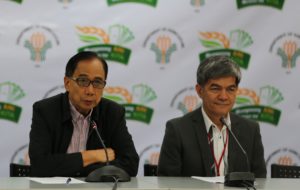
The first designated cold examination area (DCEA) for meat and agricultural imports will likely be at the Manila International Container Port (MICP), according to an official of the Department of Agriculture (DA).
In a letter to PortCalls, DA-Bureau of Animal Industry officer-in-charge director Ronnie Domingo said the Department of Budget and Management recently approved the budget for the establishment of DCEAs at five ports where meat and other agricultural imports will undergo 100% examination.
“However, due to the limitation on resources, we might prioritize the construction of one DCEA first at the Manila International Container Port (MICP) since this is the port where most international shipments for agricultural products are arriving,” Domingo noted.
He added “the series of meetings and consultations has already started” between the Bureau of Customs (BOC) and DA to iron out details of the plan.
Agriculture Secretary William Dar on January 8 announced the plan to limit unloading of agricultural imports to five ports after President Rodrigo Duterte approved the establishment of designated cold examination areas at the ports of Manila, Batangas, Subic, Cebu and Davao.
DA earlier said the move is intended to “stop the smuggling of agricultural products to the detriment of our farmers.” It also follows calls of stakeholders for strict regulations on food imports after the spread of African Swine Fever in Luzon, which had affected local pig farmers and the domestic supply in some areas.
Currently, when BOC opens a container, it is only to make a quick check of the contents for spoilage or contamination. Only when the commodities are delivered to the National Meat Inspection Service is a more thorough examination conducted.
BOC assistant commissioner and spokesperson Atty. Vincent Philip Maronilla earlier said DA’s plan to have agricultural imports unloaded in just a limited number of ports had been discussed in previous administrations, adding that “as long as there are special facilities that are going to be identified to those ports, I think that’s possible.”
READ: BOC: Confining agri imports to a few ports workable
Maronilla said the main issue with the plan is that it “might be considered as a trade barrier” by the World Trade Organization as it could limit the free flow of trade. But if there are “specific facilities” that only the identified ports could offer, then “it’s not going to be a trade barrier.”
“I think the clincher there will be the decision of the DA to actually adopt and create cold storages for these ports for the conduct of a more effective examination that will effectively deviate any issues on trade barriers,” Maronilla said.
Currently, any ports with container-handling equipment can accept agricultural shipments, Maronilla noted. – Roumina Pablo
Photo from the Department of Agriculture









